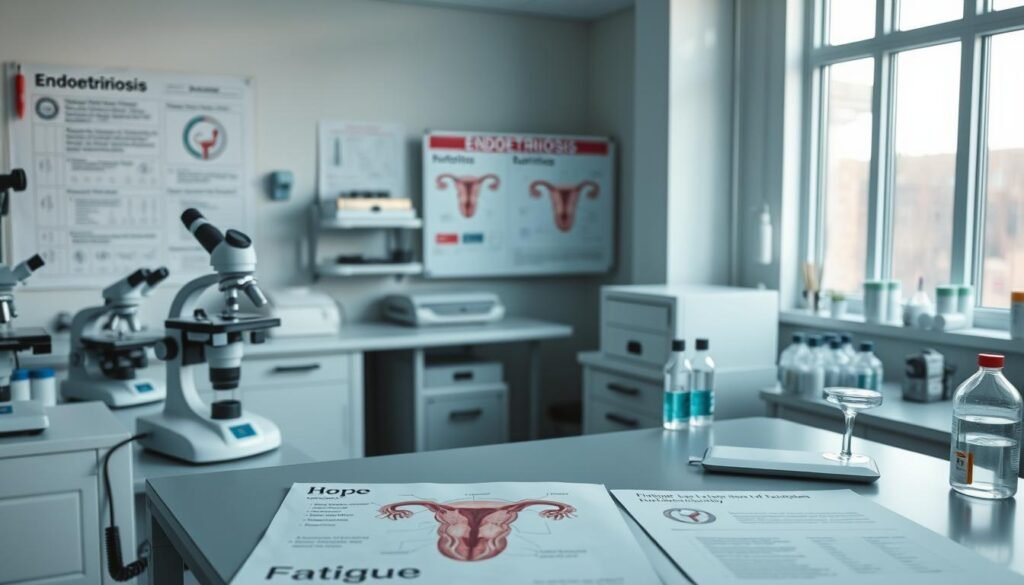Did you know that around 75% of people with endometriosis feel tired, ranging from mild to severe? This significant number shows the big impact of endometriosis on daily life. It is more than just feeling tired. Endometriosis fatigue is complex and lowers life quality for many women.
Endometriosis affects around 2 to 10 percent of American women aged 25 to 40. It brings tough symptoms like pelvic pain and heavy periods. These can cause fatigue through hormone imbalances and lack of iron. It’s vital for those affected to manage their symptoms well. This article will talk about dealing with fatigue and endometriosis. We’ll look at management strategies, how to adjust your lifestyle, and professional treatments.
For more tips on how to handle fatigue with endometriosis, keep reading. You’ll discover how this condition affects life.
Key Takeaways
- Endometriosis greatly lowers energy in many women, with about 75% feeling tired.
- There’s a clear link between pain and fatigue, showing the need for good symptom management.
- Stress and mental health are key in making endometriosis fatigue worse.
- Changing your lifestyle, like your diet and exercise, can really help improve symptoms.
- Having supportive friends and family can reduce loneliness and help emotional health.
What is Endometriosis?
Endometriosis is when tissue like the inside of the uterus grows outside it. It can affect organs like the ovaries and fallopian tubes. Around one in ten women in their childbearing years have endometriosis. It can greatly affect their health.
Common symptoms include intense pelvic pain, irregular menstrual cycles, and extreme tiredness. Around 80% of women with endometriosis feel very tired. The pain levels don’t always match the disease’s stage. This means women may feel different levels of pain at the same stage.
Nearly half of the women with endometriosis also face anxiety or depression. It’s important to see tiredness as a major sign, not just being a little tired. This tiredness is a deep, ongoing exhaustion. It makes doing everyday things hard.
Understanding Endometriosis Fatigue
Endometriosis fatigue is more than just feeling tired. It’s a deep, unending exhaustion that makes normal life harder. This tiredness greatly lowers one’s quality of life. It feels like being heavily sedated, where no amount of sleep helps.
The Nature of Endometriosis Fatigue
Endometriosis fatigue is different from simply feeling sleepy. Studies show that 70% of those with endometriosis feel this extreme tiredness. It’s the second most common complaint after pain.
In one study with women aged 18 to 49, all with bad endometriosis pain, said they were also very tired. This fatigue affects thinking, moving, and feeling happy.
Comparing Endometriosis Fatigue and General Tiredness
While a good night’s sleep might fix normal tiredness, endometriosis fatigue sticks around. Lots of people say this fatigue really gets in the way. It often warns of more pain to come.
This kind of tiredness can trigger a “boom-bust cycle.” You might do activities one day, only to need much longer to recover. Understanding this fatigue is the first step towards managing it.
Common Symptoms of Endometriosis
Endometriosis causes many troubling symptoms that greatly impact daily life. Among these, pain and fatigue are closely linked. Many women with endometriosis often feel not just pain but also extreme fatigue. Understanding this can help us see what they go through.
Link between Pain and Fatigue
Studies show a clear link between the pain from endometriosis and fatigue. When pain levels are high, it drains energy. This happens as the body uses more resources to handle the pain. A study found that more than half the participants often felt very tired. This problem gets worse during their menstrual cycle, making daily life harder.
What Patients Report
Women with endometriosis say that along with cramps and irregular periods, fatigue is common. Look at these findings:
| Symptom | Percentage of Patients Reporting |
|---|---|
| Fatigue | 100% |
| Pain with periods | 86.4% |
| Heavy bleeding | 77.3% |
| Non-menstrual pelvic pain | 50.0% |
| Back and leg pain | 40.9% |
| Headaches/migraines | 40.9% |
| Gastrointestinal disturbances | 36.4% |
In summary, up to 90% of people with endometriosis also feel very tired. This tiredness can make handling endometriosis even more difficult. It affects doing everyday things.
Why Does Endometriosis Cause Fatigue?
Let’s dive into why endometriosis makes you feel so tired. The fatigue comes from your body fighting endometrial-like tissue growth. This fight causes inflammation and releases chemicals called cytokines. These chemicals make you feel exhausted. So, to fight fatigue, we need to manage this inflammation.
The Role of Inflammation in Fatigue
Inflammation is a big reason for the tiredness you feel with endometriosis. Women with the condition often have more pro-inflammatory cytokines. This not only affects your body but your mood too, making you feel tired and down. If inflammation gets worse, your tiredness can last longer and mess with your life.
Chronic Fatigue Syndrome and Endometriosis
The link between endometriosis and chronic fatigue syndrome (CFS) is being studied more. Many with CFS also have endometriosis. About half of the women with endometriosis say they always feel tired. This tiredness comes with mental health struggles like depression and anxiety too. Helping with both endometriosis and CFS can make a big difference for patients.

| Symptom | Prevalence in Endometriosis Patients |
|---|---|
| Chronic Fatigue | 50% report experiencing chronic fatigue |
| Anemia from Heavy Bleeding | Common due to average blood loss of up to 200 ml |
| Joint & Body Pain | Pain lasting up to 7 days per menstrual cycle |
| Mental Health Issues | 2 to 3 times more likely to experience anxiety and depression |
| Loss of Functionality | Severe fatigue can lead to functionality impairment |
Treating endometriosis fatigue can get better with a whole-body approach. Tackling both inflammation and chronic fatigue can vastly improve life for those affected. To learn more about managing endometriosis-related fatigue, check out Endometriosis and Fatigue.
Endometriosis Fatigue: Understanding the Triggers
Understanding endometriosis fatigue triggers helps manage symptoms better. Two key factors are hormonal cycles and stress’s impact on mental health. Changes in hormone levels can cause more fatigue, especially during the menstrual cycle.
Menstrual Cycle Impact
Many women with endometriosis feel more tired when their hormones change. Studies found that about 50.7% report frequent fatigue. This is much higher compared to 22.4% of women without endometriosis. Hormone changes during periods can increase inflammation, leading to more exhaustion. Endometriosis-related fatigue changes throughout the menstrual cycle.
The Role of Stress and Mental Health
Stress plays a big role in endometriosis fatigue. It can make pain feel worse, causing more inflammation and less energy. Many affected women also struggle with anxiety and depression, which makes the fatigue harder to handle. Reducing stress through different methods can boost energy levels. Joining peer support groups can help too. They reduce loneliness and improve overall health, helping to lessen fatigue.
Effects of Endometriosis Fatigue on Daily Life
Endometriosis fatigue deeply affects one’s everyday life and how they manage their energy. It makes working hard and can hurt relationships with others. Knowing more about these effects can guide us in handling them better.
How Fatigue Impacts Work and Relationships
About half of the women dealing with endometriosis feel very tired. This tiredness causes them to miss work and do less, making it hard to keep up at their jobs. In a study, over 96% said their life and job suffered because of this tiredness. Relationships can take a hit too. Friends and partners may not understand what it’s like to be constantly tired, leading to misunderstandings.
Personality Changes and Emotional Well-being
Endometriosis can change how one behaves because of the pain and tiredness. It can make people feel hopeless, pushing them away from friends and fun activities. A lot also feel stressed out, with over 68% saying they’re stressed. This stress makes the tiredness worse and harms their mental health. Many find themselves more anxious and sad, making daily life even harder.

| Aspect | Impact of Endometriosis Fatigue |
|---|---|
| Work Performance | Reduced productivity and missed days |
| Relationships | Potential for misunderstandings and emotional strain |
| Emotional Well-being | Increased anxiety and feelings of isolation |
| Social Activities | Withdrawal from interactions, leading to loneliness |
Managing Fatigue with Endometriosis
Managing fatigue with endometriosis involves changing your lifestyle and diet. Many people with this condition feel very tired. Finding good ways to lessen this tiredness is key. Making certain changes in your daily life can boost your energy and health.
Lifestyle and Dietary Adjustments
Eating foods that fight inflammation is important for dealing with endometriosis fatigue. Add a lot of high-fiber foods like fruits, vegetables, and whole grains to help your digestion and energy. Cutting down on sugar and processed foods reduces inflammation and tiredness.
- Consider a Mediterranean diet focused on whole foods, healthy fats, and antioxidants.
- Incorporate supplements like magnesium, vitamin B6, and CoQ10 to potentially improve energy production.
- Stay hydrated to maintain optimal body function and energy levels.
Importance of Sleep Hygiene
Good sleep habits are critical for managing endometriosis fatigue. Sticking to a regular sleep timetable improves sleep quality. Having a relaxing routine before bed, like reading or light stretching, can help you relax.
- Limit screen time at least one hour before bed to reduce blue light exposure.
- Ensure a sleep-conducive environment that is dark, quiet, and cool.
- Engage in mindfulness practices to improve sleep quality and combat stress.
Making these changes in your diet and lifestyle can greatly ease fatigue from endometriosis. Establishing habits for good sleep and eating supports your overall well-being.
Endometriosis Fatigue Treatments
Treating endometriosis fatigue involves both medical treatments and complementary therapies. These strategies aim to ease fatigue and tackle the symptoms of endometriosis. They improve life quality by managing the chronic pain this condition causes.
Medical Options for Treatment
Medical treatments for endometriosis fatigue often include hormone therapies and pain medications. Sometimes, doctors may suggest surgery. Hormonal therapies regulate or stop menstruation, easing pain and fatigue.
- Pain Medications: Doctors usually recommend nonsteroidal anti-inflammatory drugs (NSAIDs) for severe pain.
- Hormonal Treatments: About half to 60% of women find pain relief with hormone therapies.
- Surgery: Laparoscopic surgery helps about 60% of patients feel better.
Complementary Therapies
Adding complementary therapies can boost energy and help with fatigue. These alternative approaches often lead to better well-being.
- Acupuncture: It might reduce pain and increase energy.
- Yoga: Yoga helps with relaxation and strengthens the body, aiding in combating fatigue.
- Mindfulness Practices: These methods can lower anxiety and improve emotional strength.
About 60% of those with endometriosis suffer from chronic fatigue. Finding the right mix of treatments is key. A holistic approach to treating endometriosis fatigue often results in a better life quality.
Coping with Fatigue from Endometriosis
Dealing with fatigue from endometriosis involves many aspects, focusing on both body and mind. Taking part in exercise and mindfulness can help manage energy, aiding those with endometriosis fatigue.
Mindfulness and Exercise Practices
Mindfulness, like meditation and deep breathing, helps calm the mind and lower stress. Adding gentle physical activities, such as yoga or stretching, boosts energy and health. Even short walks can help fight off fatigue. This all-around approach underlines how exercise and mindfulness are key in battling endometriosis fatigue.
Building a Support Network
Having a strong support circle is crucial for those facing endometriosis fatigue. Connecting with people who share similar struggles offers emotional support and useful tips. Joining support groups provides a feeling of belonging and insight. Such networks play a big part in handling the mental effects of fatigue. They give the needed push and hope, crucial for a hopeful recovery journey.
| Support Network Benefits | Impact on Fatigue |
|---|---|
| Emotional Support | Reduces feelings of isolation and anxiety. |
| Practical Advice | Offers strategies for daily energy management. |
| Shared Experiences | Provides validation and understanding. |
| Encouragement | Motivates individuals to engage in self-care. |
Research and Studies on Endometriosis and Fatigue
Recent studies focus on how endometriosis is linked to fatigue. About 10% of women during their childbearing years face this issue. But, in those with endometriosis, fatigue is much more common.
A big study with 1,120 women found that 50.7% of those with endometriosis felt very tired. This was much higher than the 22.4% in healthy women. These numbers show us something important.
A lot of women with endometriosis, 85.3%, struggle with significant fatigue. Yet, there’s not enough research on this fatigue, especially in large studies. Some research looked into how surgery might help reduce this tired feeling in premenopausal women.
Fatigue affects more than just the body. It can mess with school, sports, and hanging out with friends. Experts have found that pain, not sleeping well, and feeling down can all make fatigue worse for those with endometriosis.
If you’re looking for in-depth details, there’s a study that dives deep into these. It points out how vital continued research is for finding better treatments for women who are suffering.

| Study Type | Participants | Fatigue Prevalence (%) |
|---|---|---|
| Multi-center matched case-control | 1,120 (560 with endometriosis, 560 controls) | 50.7 (endometriosis) vs. 22.4 (controls) |
| Study with endometriosis patients | 280 | 85.3 |
| Pilot study post-laparoscopic surgery | 60 premenopausal women | Marked reduction in fatigue |
Seeking Professional Help for Endometriosis Fatigue
Dealing with endometriosis fatigue requires action. To get help, one must talk clearly with healthcare experts. It’s smart to prepare for these talks in advance.
How to Prepare for Consultations
Getting ready for doctor visits is key to tackling fatigue from endometriosis. Take note of when you feel tired. Focus on:
- The frequency of fatigue episodes
- How they affect your daily life
- Other symptoms that offer clues about your condition
This prep helps doctors give advice and treatments that fit you best.
Importance of Tracking Symptoms
Keeping track of endometriosis symptoms is crucial. A symptom diary makes it easier to talk to your doctor. You should jot down:
- When you feel most tired and what sets it off
- How your symptoms change over the month
- How they impact your mood and overall emotional state
A diary doesn’t just help spot trends. It also makes your talks with doctors more useful. This approach lets you manage your health better. It helps you get the right support for endometriosis fatigue.
| Symptom | Frequency | Impact on Daily Life |
|---|---|---|
| Fatigue | Daily | Severe |
| Pain (pelvic, back, etc.) | Weekly | Moderate |
| Gastrointestinal Issues | Occasional | Mild |
Conclusion
Understanding endometriosis fatigue is key to improving life for those who have it. About 50-70% of women with endometriosis face severe fatigue. This symptom is not just common; it’s also deeply impacting.
Many deal with fatigue every day. A huge 95% find it disrupts their daily life, and 19% say it’s extremely limiting. This issue connects physical pain closely with mental health, affecting mood and relationships.
To manage endometriosis fatigue well, a broad strategy is needed. It involves knowing the symptoms, avoiding triggers, and trying different treatments. Women should adjust their lifestyles, ensure enough sleep, and try mindfulness to beat fatigue.
Because fatigue is linked with pain and stress, treating endometriosis pain can lessen fatigue. This can make a big difference in well-being.
Women can better manage their endometriosis by being well-informed and standing up for their health. Whether it’s getting help from a professional or changing daily routines, knowing about fatigue’s effects is the first step. It’s crucial for a better life.